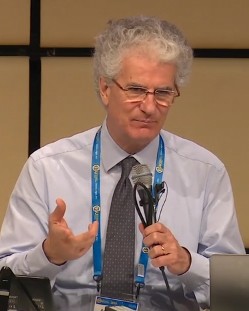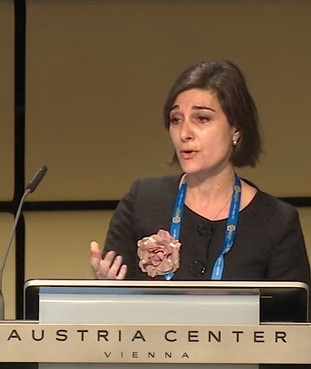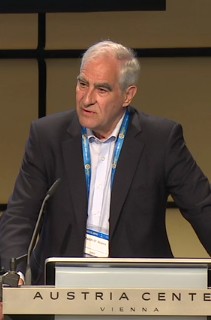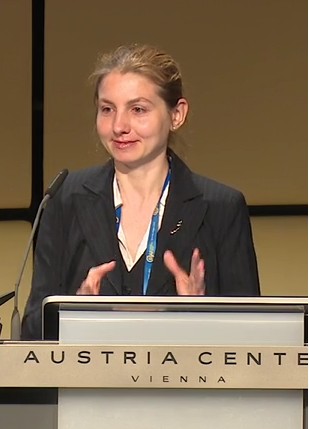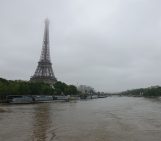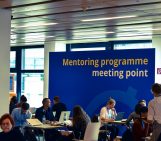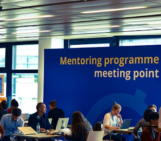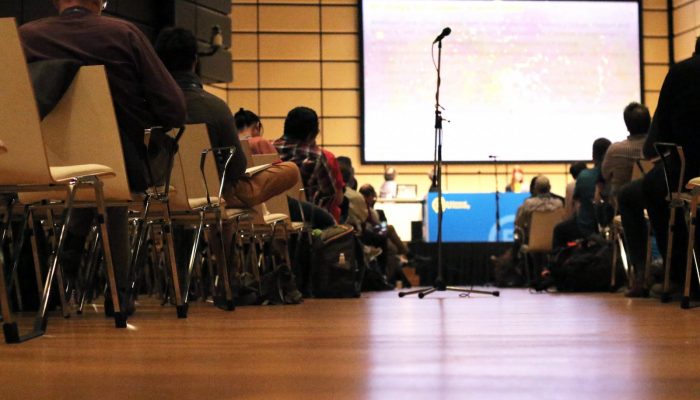
Scientific research in a changing European Union
The 2018 EGU General Assembly was a huge success. Not only was it the biggest yet (with over 15,000 participants) but it also held a large variety of Short Courses, Townhalls and Union Symposia that gave the scientists attending a chance to step out of their comfort zone and learn about something other than their area of expertise.
One example of such a session was the Union Symposium titled: Scientific research in a changing European Union: where we stand and what we aim for? This session had some fantastic speakers who described some of the current challenges and potential threats to academics living in the EU as well as the advantages.
Dr Andrea Tilche, Head of Unit, Climate Action and Earth Observations at the European Commission, kicked-off the session by outlining the work done in previous EU research frameworks and the direction that the EU will be heading after 2020, when the new Framework Programme (FP9) will take centre stage. Tilche stressed the importance of collaborative research, addressing societal challenges and combining fundamental research and innovation in overcoming both global and European challenges.
During the discussion component of the session he highlighted the public’s growing disenchantment with the elite as a threat, not just in Europe but globally. Tilche reminded participants that, as scientists, they can be seen as part of this elite class and that this could lead to a feeling of disengagement towards science from the general public. He finished by stating that we, as scientists, have to be wary of this. We must share our knowledge and explain why the European Union is so important to those outside of our own academic bubble, notes Tilche. “When I talk to scientists, I very rarely talk to people who are opposed to the EU but we have to pass this message onto others”.
Dr Claudia Alves de Jesus-Rydin, coordinator of the European Research Council’s (ERC) Earth System Science division, went on to talk about how the ERC benefits both members of the European Union through its various research funding programmes, and the world through its international agreements. Furthermore, Alves de Jesus-Rydin underlined the capability of ERC programmes to prompt some European countries to implement similar projects at national scale, creating impact on a smaller scale. She explained that the ERC takes a bottom up approach when providing funding to scientists living in the EU, allowing them to steer the topics and themes researched. A high degree of flexibility is also given to the funded scientists, ensuring that their project can be altered as their research continues to develop.
During the discussion, Alves de Jesus-Rydin emphasised the ability that academics in Europe have to steer their own future and the European Union in a positive direction, “It is extremely important for scientists to speak up. It isn’t always easy because that’s not your job. Your job is to do science. But you cannot isolate yourselves from this discussion. I think the sessions that you are organising here and the efforts that the EGU are doing in regards to policy are extremely important. The voices of scientists must be heard.”
The next speaker, Sir Keith O’Nions, Chairman of the Cambridge Enterprise Board and former UK policy advisor, outlined some of the risks that result from the increasingly complex geopolitical framework and the changing political landscape. He mentioned the threat of short-term investment policies in Europe and reduced confidence at all levels. He stressed that we need to be “realistic about these risks but not depressed about them”.
O’Nions underlined the important role that the geosciences must play in finding solutions to social challenges, both now and in the future, “The geosciences are at least as important in the future as they have been in the past”. He explained further by listing some of the challenges that come with living on a planet that must sustain 10 billion people, a target that we are likely to reach by 2050. Sustainable growth, sustainable energy, sustainable food supplies, and natural hazards with a denser population were given as examples that will “require a huge amount from geosciences research”.
O’Nions was optimistic that the EU is rising to the challenge and that researchers are better at converting research into societal change than EU policymakers tend to believe. He was also in the same mind as his preceding speakers, stating that it was vital for scientists to be more involved because the European Union “… ultimately has to be bottom up”.
Dr Ira Didenkulova, a senior researcher in Tallinn University of Technology, closed the presentation section of the session by focusing on her personal experience of moving from Russia to Estonia soon after it had joined the European Union. She emphasised the importance of the EU’s cross-border programmes, reduced travel bureaucracy and researcher mobility while also explaining some of the benefits of research mobility such as knowledge exchange and increased collaboration. Didenkulova also mentioned the challenges that researchers living abroad may face, despite the European Union’s focus on mobility. She highlighted some statistics that showed both female researchers and researchers who are parents are less likely to be mobile and stated that more family friendly research meetings and conferences are needed.
I think it’s notable that almost all of speakers underscored not only the abiliy but also the responsibility of scientists to engage with policymakers and the public. The optimism expressed by the speakers regarding the future of the EU despite the challenges, was also refreshing and a great message to all participants on the final day of the 2018 EGU General Assembly. If this session inspired you to engage more with the public or policymakers you can find various resources and tools to help you on the outreach and policy sections of the EGU website.
A big thank you to all of the speakers and Dr Francesca Pianosi, the moderator of the session. If you missed the session or would like to see it again, you can watch the web streamed version in its entirety here.

